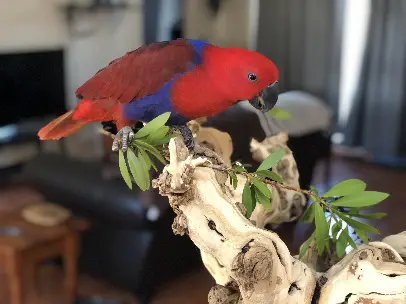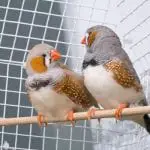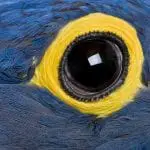To live a happy and healthy life, our feathery fellows need suitable bird cage perches.
Being especially helpful accessories for your pet’s little home, perches offer a number of priceless benefits to your bird companion.
By choosing the ideal bird perches, you will allow your pet to satisfy its chewing instincts. Also, you will provide it with something to stand on.
Other types of perches are excellent for giving your bird’s nails some proper trimming. There are perches made to let your bird scratch its beak as necessary, too.
Last but not least, some bird perches will give your feathery friend a wonderful item to play with.
How to Choose the Best Bird Perches?
Being the dedicated bird care enthusiasts that we are, we understand painfully well that picking the best bird cage perches does often come with some challenges.
After all, there are so many types of perches to choose from!
That’s why choosing the best ones out of the bunch can easily turn into an overwhelming endeavor.
Join us below, and you will be able to pick the best bird cage perches for your pet with ease, confidence, and a smile.
#1 – Cement Cage Perches
Cement perches are wonderful in helping your bird pet trim its nails and beak.
Most avian vets do agree that providing one cement perch is good for your pet’s well-being.
However, you must make sure to include several other options.
If you rely solely on cement perches, this can easily lead to having your pet hurt its feet.
Effortless to clean and quite long-lasting, cement cage perches can be of great assistance.
Short Summary
- Durable and easy to clean
- Great for nail and beak trimming
- You need to provide other bird perches, too
#2 – Dowel Cage Perches
Usually, dowel perches are readily available as they come with most cages.Note that a dowel perch can be harmful to your pet, especially if it is the only perch option you rely on.
In fact, some experts recommend removing all dowel perches that come with the cage.
Dowel perches don’t provide equal pressure to all the points of your pet’s feet and claws. By always getting their claws in the same diameter, your bird pet can fall victim to health issues.
Short Summary
- May lead to health troubles if used improperly (never use a dowel perch as the only option).
#3 – Edible Cage Perches
Calcium perches are certainly the most popular type of edible perches.Just like their name suggests, edible perches double as nutrition.They also provide your pet bird with something to chew and walk on.
Note that many cage birds tend to suffer from calcium deficiency. Therefore, Calcium perches will help to keep your pet healthy and satisfied.
Short Summary
- Double as something to chew and walk on
- Added nutritional value
#4 – Heated Cage Perches
Heated perches will help you keep your bird pet warm during the cold winter season.
A heated perch will help you save money, as you will not have to heat up the whole house to keep your feathery fellow healthy and comfortable.
Do note that heated perches work best for warmth-loving birds.
In the wild, many birds spend the cold winter nights roosting communally. When provided with a heated perch, you can expect to see your bird pet spending most of its time roosting on it.
Short Summary
- Save money from high electricity bills
- Keep your bird warm and cozy with ease
#5 – Sandy Perches
Sandy perches are similar to cement perches in the sense that they helpbirds in nail trimming. Nail trimming is a crucial part of bird grooming in general.
Don’t be afraid about the sandy coating, possibly causing harm to your pet. It is the sandy coating that will give your bird the chance to file its nails.
Do opt for nothing but highest-quality sandy perches, though.
Low-quality sandy perches can lead to foot problems, in particular, painful abrasions on toes and feet alike.
Sandy perches also double as an excellent place for your pet to stand.
Short Summary
- Fantastic for nail trimming but you need to stay on the watch for possible abrasions
- An excellent place for your bird to stand
#6 – Rope Cage Perches
Did you know that some birds can swing quite similarly to the way human musicians can?
Rope perches are great for swinging! Also, they give your bird the vital opportunity to exercise.
Rope perches are effortless to wash and are fairly long-lasting.
However, you need to be especially careful about damaged ropes.
Remove the perch if you notice that your bird is continuously chewing it, as it can accidentally swallow strands, leading to health issues in return.
Short Summary
- Durable and easy to clean
- Wonderful for exercise and entertainment
- Can be harmful if ingested
#7 – Plastic Cage Perches
Plastic cage perches seemingly have many strong sides.
They are long-lasting, available in a variety of sizes and shapes, and are very affordable.
While there are versatile uses and benefits of plastics, items made of plastic materials can be very hazardous to your pet’s health condition. If ingested, plastics can lead to serious health issues.
Also, plastic is bad for the environment.All of the above beings said, opt for nothing but the highest-quality plastic perches. Always stand on the watch for chewing. If this is the case, it is best to remove the plastic perch.
Short Summary
- Very durable
- A variety of shapes and sizes
- May lead to health issues if ingested
#8 – Wooden Cage Perches
Wooden cage perches make the safest, most natural choice. And birds love the
You can find wooden perches available in a wide range of shapes and sizes. Apart from catering to your pet’s needs, wooden perches may just as well enhance the aesthetic appeal of the cage.
Make sure to choose a wooden perch that doesn’t have any spray coating. Spray coating is toxic to birds.
However, bird-safe wooden perches with no spray coating are safe to chew.
If you’re looking for the toughest type of wooden perches, go for manzanita perches. Other suitable types of wood for natural perches include magnolia, fir, willow, cholla, dogwood, ash, and pine.
There are numerous advantages of wood as a building material, and just as numerous advantages to your pet’s well-being when you make use of wooden perches.
Short Summary
- Not as long-lasting as synthetic perches
- A tiny piece of the natural environment to your bird
- Opt for bird-safe wooden perches with no spray coating
The Best Bird Perches: The Wrap-Up

Did you enjoy reading this article as much as we enjoyed compiling it?
Your collection of bird cage perches should ideally include at least one an edible perch, one sandy or one cement perch, and a soft perch created from natural materials.
For bird caregivers dealing with smaller-sized cages, it is fine to skip on the edible perch, though.
Join us in the comment section below. We are happy to hear any questions, ideas, personal experience, or just about anything you would love to share with our community!
We firmly believe that those who care share. If you like this article, don’t hesitate to share it with friends! Together we can help more people make the best-informed decision when selecting bird cage perches for their feathery fellows.


